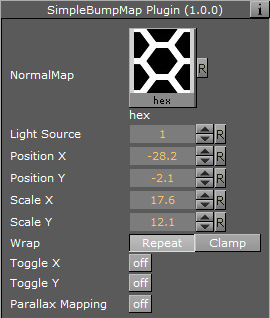
Viz Artist User Guide
Version 3.14 | Published October 30, 2020 ©
Simple Bump Map

With this plug-in you have the opportunity to simulate complex surface structures. Instead of many triangles to render a 3D object with many structures on its surface you can use bump mapping to get a similar result.
You can only use a gray scaled image as normal map. If you want a more accurate result and better effects please use the Bump Map plug-in instead which is using an RGB normal map image.
To generate a Simple Bump Map you can use the plug-ins for Photoshop, Gimp, the built-in functions of your modeling package or NVIDIA’s tool Melody. The Height Map (used for parallax mapping) should be a grayscaled image (white -> highest, black -> lowest bumps).

Note: All calculations are done in object space.
Note: This plug-in is located in: Built Ins -> Shader -> Material
Simple Bump Map Properties

-
NormalMap: Stores a direction of normals directly in the RGB data. Move an normal map via drag and drop onto this field.
-
HeightMap: Move an height map via drag and drop onto this field. The Height Map file is only visible and used when parallax mapping is enabled.
-
Light Source: Selects the light source in the range 1-8. Please consider that only one light source is possible. By default the first light source is used.
-
Position X and Y: Defines the position of the normal map in X-direction and Y-direction.
-
Scale X and Y: Scales the normal map, respectively changes the width and height size of the image.
-
Wrap: Repeats or clamps the bump map for the image.
-
Toggle X and Y: Changes the direction of the normals stored in the normal map image.
-
Scale Height: Changes the intensity of the bump map effect. Scale Height is visible when parallax mapping is enabled.
-
Parallax Mapping: Provides an additional map to the texture for more apparent depth and the object is more realism.
See Also